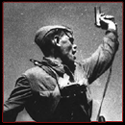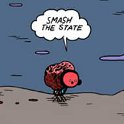|
The link you provided is just a png image....where can I get the audio? Sorry if I'm completely clueless  . .
|
|
|
|

|
| # ? Jun 5, 2024 13:33 |
|
It should lead here if you click on it.
|
|
|
|
Hope I'm not late to the party, but I've been bad at keeping up with the thread. Like you guys, I used to have horrible phobia of polyrhythms. But I'm a survivor! And now that I've been on the other side, it's really not so bad. You're probably just overthinking things just like I used to.polyfractal posted:polyrhythms Remember that Chopin is a Romantic-era composer, which means his pieces are relatively lax on the rhythm (you can go ahead and call it full of "feeling" and "rubato"). Figure out approximately where the left hand fits in with the right hand, play that a few times, then just take the leap of faith and let yourself go. Really, that's what it is. A leap of faith. Just remember that it's okay to speed up/slow down either hand; again, it's Romantic-era stuff after all. Treat these runs as "grace notes" that are there to embellish, rather than forming central pillars of the melody, if that helps at all. The trick is to make the speedup/slowdown convincing enough. I know that feels like cheating, but seriously, most people cheat on this. CowOnCrack posted:Fantaisie-Impromptu I think I complained to my piano teacher about a tiny single-measure polyrhythmic snippet in some random piece. He then goes "since you love polyrhythms so much, why don't we work on this?" So he threw me onto this* (http://www.youtube.com/watch?v=8KtY5dvF2_A). What a jackass. It's not quite Fantaisie-Impromptu, but it's the same idea -- 4 against 3. Anyway, as above, he had me practice fitting each note in the right place and not worrying about rhythm: just play both hands, very slowly, as together-left-right-left-right-left-together-left-right-left-right-left-... You're probably still overanalyzing at this point and trying to subdivide finely and fitting it exactly where it belongs. Well, try not to. Just force yourself to have atrocious rhythm. The point is to make your hands comfortable with not playing together. Next, play one hand at a time at full speed, just to build the muscle memory of what the "correct" rhythm is. Doing this just a couple of times will probably be fine. And then again, as above, take the leap of faith. Play it at full speed (i.e., don't speed up a little at a time from step 1) and let yourself go. Just do it. Don't even try to think about it, don't try to listen to one hand at a time and wonder "are my notes evenly-spaced-out," because that will mess you up. I promise you that you're doing fine -- you're probably doing much better than you think you are. Once you feel a little more secure in your ability to play polyrhythmically, you can go ahead and listen to one hand at a time. You'll be pleasantly surprised. * = This was the first Chopin etude I've ever played. The second Chopin etude I've played was Op. 10 No. 1 in C major, "since you like arpeggios/broken chord passages so much" (I was actually decent at that compared to everything else though). To this day, I still think it's one of the harder Chopin etudes technique-wise. Jackass.
|
|
|
|
I love the Etudes soooo much, I want to learn all of them. Too bad they are so hard  Working on the G# minor one currently, wheee thirds.
|
|
|
|
The greatest thing is when you play your first polyrhythmic Chopin piece, and you're having such a hard time wrapping your head around it properly for a week or two. Then you get it... then you play more Chopin... then you don't even have to think about it anymore, you've played so much 4 against 3 that it might as well be 4 16ths against 1 quarter
|
|
|
|
Blog Free or Die posted:I love the Etudes soooo much, I want to learn all of them. Too bad they are so hard Ow. If there were one Chopin etude I'd never want to learn, it's the thirds one. The idea of it already sounds awful to me. I'd probably personally find that one the hardest etude. Finally gotten around to listening to it. Yeah yeah, mistakes, but they happen. Sounds quite good otherwise! If there's any bit of criticism, I'd like to hear more "big phrasing", if that makes any sense. (Though it could just be that the recording isn't picking up any of the nuances you're putting into it. I can't really tell that well.) Your "detailed phrasing" sounds great -- as in, phrasing in between small groups of notes sound great. They're just enough and not overdone or anything at all. But since there are a lot of repeated phrases in the piece, these segments sometimes sound a little same-y. If you try and do something in between phrases, like make each phrase sound a little different from another, so that the segments are "going somewhere," I think it could sound really fantastic. I don't know if I'm describing what I mean well. To compare it to a work of writing, it's like you're using awesome, poetic, vivid imagery, but sometimes paragraphs as a whole aren't going anywhere. They're not advancing the plot, building a character, etc. Does that make more sense? Just two cents from someone who never played the piece herself, and tends to be way too harsh on people. Honestly though, it sounds quite nice, and I think the piece suits you well.
|
|
|
|
facepalmolive posted:Ow. If there were one Chopin etude I'd never want to learn, it's the thirds one. The idea of it already sounds awful to me. I'd probably personally find that one the hardest etude. It's been going faster than I expected, actually. I think it has a big learning curve just getting used to feel of fast thirds, but once the fingering starts falling into place it's pretty doable. When it's slower, anyway, I think it's going to get hard again when it comes time to speed it up. At least it didn't shut me down immediately, though, like some of the other etudes. And I feel it's possible to one day play it at the proper speed, unlike one of my other favorites, op.25 no.4. My left arm gets too tired if I try any speed besides far too slow
|
|
|
|
If you need polyrhythm help, play Debussy's Arabesque #1. Basically sight-readable and a good introduction to hemiola, albeit that's a different beast from 4 against 3. But it's a step in the right direction! Also as per facepalmolive's comment, please don't abuse rubato... rubato does not mean "I can get away with not practicing this section." People try that poo poo all the time with the sustain pedal and it's really drat obvious and you're not fooling anyone.
|
|
|
|
When you're learning something quite long, or varied how do you do it? Assume its actually a challenging piece for you not something you can just sight read your way through and bash out pretty well first time. Do you go through it all, learning it to a sort of, I play the right keys at the right time in the right order then go through phrase by phrase and work on making it musical rather than just technical (if you get what I mean)? Or do you sectionalise it first, perfect (again you know what I mean) each section then move onto the next? Or something entirely different!
|
|
|
|
Personally, I break things into shorter sections and "get them in my fingers" meaning just get the rhythm and notes down, working on fingering, etc. Which is not to say that I don't attempt to work on expression at all, just that it's not the main focus exactly. Then I add sections but I don't stop playing through the older sections that I've already learned, because they tend to drop in quality rather quickly and I just have to re-learn them anyway. Once it's all learned, then I spend a good amount of time trying to make it "perfect" which I have never actually done of course.
|
|
|
|
By perfect I should probably have used a better word. Acceptable standard for whatever context you're in would probably have been better.
|
|
|
|
Cast_No_Shadow posted:By perfect I should probably have used a better word. Acceptable standard for whatever context you're in would probably have been better. Eh, I know what you meant. I just get mad at myself occasionally because while I've learned a ton of stuff, some days I feel like I've never well and truly mastered anything the way the pros do.
|
|
|
|
Ok, I've had a keyboard for years and I've only played on-off. I'm not too shabby with my right hand, but when I try to put my left hand in, I may as well be mashing my face against the keyboard. Are there any exercises I can do to help the co-ordination? Also, I've recently bought a midi cable and I've got it all linked up; I've been thinking about using Synthesia to help teach myself things, but I have a feeling that'll just give me bad habits. Any advice?
|
|
|
|
Bob Shadycharacter posted:Eh, I know what you meant. I just get mad at myself occasionally because while I've learned a ton of stuff, some days I feel like I've never well and truly mastered anything the way the pros do. Luckily the pros feel the same way too.
|
|
|
|
Fingerless Gloves posted:Ok, I've had a keyboard for years and I've only played on-off. I'm not too shabby with my right hand, but when I try to put my left hand in, I may as well be mashing my face against the keyboard. Are there any exercises I can do to help the co-ordination? Outside of getting a tutor? Learning to play two-handed scales would be the easiest way to start, making sure you get the fingering right (work out where the fourth finger goes). As for actual pieces, most people find mixing right and left hard, really there isn't any trick apart from doing things very very slowly to start with. Also try the Bach inventions, they're fantastic for building up left-hand strength and speed.
|
|
|
|
Cast_No_Shadow posted:When you're learning something quite long, or varied how do you do it? Assume its actually a challenging piece for you not something you can just sight read your way through and bash out pretty well first time. The longest piece I've completely learned is around 3 minutes, so I don't have personal experience with something very long (although I've got something in the works). I do know that when you are learning a piece, how you learn it is quite important, and it's super easy to be wasteful. The first thing that helps me when learning a new piece is to NOT try to learn the notes start to finish and get them in muscle memory. This is what I did with pieces before I got some better instruction to do otherwise and you will quickly hit limits with what you can learn with just rote muscle memorization. It's hard to see how big a difference it would make to change your approach slightly, but believe me, it does. C.C. Chang's Fundamentals of Piano Practice (check out the piano world links in this thread) has a lot of useful advice about learning a piece. The first thing you should do is break down the piece musically - sub-divide the piece into it's musical elements such as phrases, themes, motiffs, movements, etc. Do not just practice it from beginning to end over and over - practice musical phrases (or sentences) in isolation and then work on bringing them together. Playing from beginning to end will work on simple beginner pieces, but once you move on to longer and harder ones this approach is hopeless. On that note, when learning a brand new piece, I would ditch muscle memory entirely for the first week or so (less depending on the difficulty). Relying on muscle memory is a mistake a lot of beginners make (including myself) and it works fine for earlier level pieces, but can only carry you so far before it fails miserably. For longer more difficult pieces, I would just focus on understanding the piece musically and structurally for some time, and forming connections with it. By connections I don't necessarily mean emotional or expressive connections (those are also great of course!), but more associative connections to assist in memory. How can you make the piece make sense to you, so that your memory will be enhanced? Analyze and break down the structure of the piece. Even if you don't know a lot of formal theory, you can still do a lot to connect with the structure of the piece even if it's as basic as "Ok, this chord is white key, black key, white key!", "OK, this is where the scale stops, and the thirds begin" or "this part is all white keys" etc. Personally, if the piece is a character piece, I like to think of the story the piece is telling to help me remember and get a feel for where it goes. "This is where the dance slows down for a bit, then picks up again" for example, or "This is where the forest murmurs get quiet and you can hear the melody of the singing birds more clearly." The more associations, the better. Human memory is associative and works in a counter-intuitive way. Experts at memorization accomplish incredible feats because they have so many associations or routes to their knowledge, and this just allows them to have even more, which creates this kind of iterative exponentially exploding memory network (I just lol'd at what I wrote there.) So sit down with a piece and spend all the time in the world on understanding it MINUS the muscle memory. If you've got absolute pitch and / or are working on ear training, see how much of the piece you can put together in your mind. Most people don't have absolute pitch so you might have to work backwards or forwards in relationship to some point. Knowing how all the scales / arpeggios / cadences sound will go a long way to this. Once you've got the piece nailed down visually, structurally, aurally, then when you do start learning the notes, you'll find that what you are playing comes alive. It makes sense as music, and not just rote notes. As I mentioned relying on muscle memory too much is my own unique problem and my approach reflects this, but I hope this info can still help out. Also, more WTF Hamelin! http://www.youtube.com/watch?v=MRFGIUN2MLA&feature=results_main&playnext=1&list=PL2F636FDFC627382B what even is that thing?
|
|
|
|
Alkan's a notoriously difficult piano composer. Liszt supposedly said Alkan had the best piano technique of anyone he knew... loving Liszt. edit: Those who said they find 3-against-4 polyrhythms particularly frustrating, the last movement of his "Concerto for Solo Piano" will give you nightmares for the rest of your lives. Along I imagine with almost anyone who tries to play it who isn't a piano demigod. OneSizeFitsAll fucked around with this message at 03:42 on Mar 20, 2012 |
|
|
|
The pianos back then didn't have such heavy action though, it was a bit easier to play all those fast notes (but the leaps were just as bad).
|
|
|
|
As was the timing and close-in dexterity requirement. Generally true about the action, though pianos vary of course - some modern ones have very light actions, and remember Liszt and Alkan's time was when the fortepiano was giving way to the modern grand. Still, I remember the Wiki article on the Hammerklavier sonata suggesting that it wasn't appreciated until the 20th century, "possibly due to the difficulty of gaining a technically competent performance". Although their reputations and the supreme difficulty of some of their music give us a decent idea, it's hard to definitely judge just how good the technique was of great pianist composers like Beethoven, Liszt, and Chopin as obviously no recordings exist of them. Rachmaninoff is the exception, and he has topped a couple of polls of professional pianists as to the greatest player of whom recordings exist.
|
|
|
|
Well, we do have pianos from that era hanging around. I wonder if pianists who have a chance to play on them find it easier to do certain things? I actually got a chance to play some of the instruments they have in the Museum of Fine Arts here in Boston once. Normally they don't let people do that, obviously, but I was leading a field trip so after all the students left they were like, hey, wanna touch the 18th century piano!? And I was like HELL YES. Of course I don't remember much about what it felt like to play it.
|
|
|
|
Completely new piano player here, have a couple questions about getting into it: 1) Does anyone have suggestions for finding a good teacher? Most of the stuff I've found on google and yelp is either old or only based on one or two reviews 2) Is buying a used keyboard off craigslist a bad idea? I have no idea what to look for in terms of damage/defects or whatever else, I'd be afraid of getting ripped off. Or if anyone has a good recommendation for something in the ~$100 range that would help too.
|
|
|
|
stanislaus posted:Completely new piano player here, have a couple questions about getting into it: From someone in the same boat a couple of months ago. 1) Getting a new teacher is a bit trial and error if you don't have any recommendations. Ask about, I was surprised at the amount of people I knew who played piano and could help. Alternatively, get in touch with any you can find on the internet etc. and ask them a couple of questions about their style and what they think is important, see how well it matches with what you want to learn and perceived wisdom of places like this thread. Getting a good teacher is soooo important especially if you want to eventually play difficult classical pieces. If you just want to bang along to pop songs however, anyone with a decent knowledge of the instrument will probably do (here are the keys you press, it makes X chord, make sure you do\don't do this so you don't get carpal tunnel). 2) Can't really recommend specific models as my knowledge isn't wide enough. If you want to go down the classical route, or in any way take things seriously or may do in future I do know you need a couple of things. Weighted Keys Touch sensitive keys Weighted better simulates a real piano, gets your fingers used to the right sorts of pressure you need to use to make certain sounds and stops you getting horrible hand injuries. Touch sensitive means when you play a note hard the keyboard responds with a loud note, when you play softly it plays a soft note. These are very important things. I'd also suggest 88 keys, but this I guess depends on if you need all those octaves or not. classical\experimental stuff yeah you probably will. Dance music? Don't worry about it. Saying that. I have a really nice keyboard, its lovely, each individual note sounds pretty much spot on and far more pianoy than any piano I've played. But holy gently caress do I wish I had a piano, even a crappy old poo poo box. There is such a difference in being able to really feel the music in your fingers, its so much more alive. 
|
|
|
|
Cast_No_Shadow posted:Thanks for the post, I should've specified I'm interested in learning classical piano. I found someone selling this http://www.amazon.com/Casio-PX-100-Privia-88-Key-Digital/dp/B0001Q25P6/ref=cm_cr_pr_product_top used for $300 with a bench included, any opinions? It seems like it has the important features for a beginner (weighted, 88 keys, etc.), and I couldn't care less about any other keyboard-type features
|
|
|
|
You really should go to someplace like Guitar Center and play all their digital pianos. The action on each piano is going to be different and it may end up that you hate how the Casio feels and love something else. As far as lessons go, if you live near a university or community college, email their piano/music professors for suggestions. They might suggest you take a group piano class, or refer you to one of their students.
|
|
|
|
stanislaus posted:Thanks for the post, I should've specified I'm interested in learning classical piano. I found someone selling this http://www.amazon.com/Casio-PX-100-Privia-88-Key-Digital/dp/B0001Q25P6/ref=cm_cr_pr_product_top used for $300 with a bench included, any opinions? It seems like it has the important features for a beginner (weighted, 88 keys, etc.), and I couldn't care less about any other keyboard-type features I don't know that model but I have the Privia PX-310 (also a Casio, in the same line, obviously) and I love it. I paid about $400 for it used, but it did not include a bench or a stand, which I had to buy separately. You can get away with a cheap keyboard for a little while but if you can afford it I'd suggest going straight to a model that will actually feel like a piano because you'll want to eventually. I got mine from a local used shop (one I know well). If there are any shops around you that sell used gear, it would be best to try before you buy. See if you can get a friend who knows what they're doing to go with you.
|
|
|
|
This thread will not go a month without posts! So to ask a question, when I'm attempting to cover songs that are basically guitar songs I can never get it to sound anything near right. I mean I can bang on chords and octaves to match what the rhythm guitar plays, but it sounds so empty. How do you go about transposing something to piano
|
|
|
|
guppy posted:I don't know that model but I have the Privia PX-310 (also a Casio, in the same line, obviously) and I love it. I paid about $400 for it used, but it did not include a bench or a stand, which I had to buy separately. You can get away with a cheap keyboard for a little while but if you can afford it I'd suggest going straight to a model that will actually feel like a piano because you'll want to eventually. Also its a bit late in the day, and you probably have made your purchase now, but I also have a Privia, 7XX something, its a very nice digital piano and I have no complaints but every time I sit at a real piano I yearn for one. The difference is palpable.
|
|
|
|
When I am translating something from guitar to piano I usually arpeggiate all the chords, even if they are just block chords in the original. Or if that's too lullaby-ish, I separate the bass note from the rest of the chord and try to do interesting rhythmic things with it. I'm not much of a jazz pianist but I'm looking for a decent keyboard that would serve my middle school jazz band well. Something that we can take to gigs, should we ever have any, and has at least a limited amount of voicings. I don't really know what features I should demand and what don't matter. It's middle school so for all anyone cares I could go get a little 20-key Casio and call it a day but I'd like to get something that will be a good, lasting investment for my program.
|
|
|
|
I've been trying to find a digital piano that will work for me, it should be mentioned that I am well within the "Beginner" range. But I want to make sure I don't buy something and have to replace it in a few years because I bought the equivalent of a lemon or something. So I've been trying to go to music stores and sit at different digital pianos and get a feel for them. My step mother has a grand that I started learning on but now distance precludes dropping in to use it. So I wanted to ask is the Yamaha DGX-640 any good? It felt like a nice action and it seemed to play the different tones well. It was 699.99 at the store I was in is that a good price? It seems better than Amazons at the moment but I really don't know.
|
|
|
|
I stopped playing piano when I was about 12 years old. Now that I am 23 I have started practicing again. It worries me, that I might learn 'bad habits' and actually do my playing great harm in the long run. My left hand tires very quickly, is this normal? Or does it indicate that there is something wrong about my technique / posture? Should I try to find myself a teacher? Or do you think old teachings might be enough to get by? Also if you think getting a teacher is a must, should I stop playing on my own before I actually start the lessons?
|
|
|
|
Silkki posted:I stopped playing piano when I was about 12 years old. Now that I am 23 I have started practicing again. It worries me, that I might learn 'bad habits' and actually do my playing great harm in the long run. A good teacher is pretty much always very important early on if you want to reach a high level of playing, because most people are not capable of re-inventing the wheel and a teacher will show you the proper ways to practice and reveal your mistakes to you as they happen. It's not really possible to self-teach yourself completely unless you're Art Tatum or some kind of crazy prodigy. I am sort of in the same boat, except I never played formally at all when I was younger - just by ear and messing around at the piano. I was too hyperactive for piano lessons - I'd just run away from the instructor and run around the house. I never took it seriously until I took a group class at community college in 2005. After two semesters, I didn't take another class or practice much until after I finished university. My next semester was in Spring 2009, and then one in Fall 2010, and finally one in Fall 2011 and Spring 2012. So I've had six semesters of serious instruction and I've had one-on-one lessons for about 8 months from a local instructor/composer. Although I got sort of far (or at least, I thought I got sort of far) learning on my own, I slowly realized how there were so many gaping holes in my knowledge and so many problems with my technique that the only thing I could do is destroy everything I taught myself and rebuild from the proper foundations. There is quite a lot of knowledge out there and not really any good places where it is well documented - actually a lot of it really can't be documented, it has to be demonstrated in person, or a problem must be recognized as its individual manifestation in a particular student by an instructor. For all aspects of playing, it has been my one-on-one lessons with a nearby instructor / composer that has helped the most- by far. The group classes have also been fairly helpful, but they can be limited since the instructor has minimal time to address each student's needs. Still, I would strongly, strongly recommend checking out nearby community colleges and seeing if they have music programs. Group music classes are some of the best investments of time and money I have ever made. For around $30 a unit and $35 for parking, I've got an incredible group class instructor, access to a huge music library, and access to practice rooms with acoustic pianos for 6 out of 7 days of the week. Not to mention I get to be part of a community of some very gifted and talented faculty / students. The music program at my local CC, El Camino Community College, happens to be a very strong program. Also, community college in California tends to own harder than a lot of other places, so your mileage may vary. It is likely that these music programs will have contacts for one-on-one instructors as well. I think it's fine to practice on your own before getting formal instruction but I would recommend against trying to accomplish too much too soon. Play very simple pieces, learn them very, very slowly, and try to make them as musical as possible. Always learn hands separately first. Always learn to play everything correctly the first time - accent the right beats, follow the dynamics, don't speed up or slow down (use a metronome!), etc. Put pieces hands together super, super, SUPER slow. Always play so slowly that there is absolutely no tension, and always focus on making the playing as easy as humanly possible. Minimize and economize the motion of your hands/arms/torso. If you are experiencing any tension, pain, discomfort, then you are going way too hard. If you are playing something you have practiced a lot and it comes out uneven and with lots of mistakes, then that piece is too hard for you and trying to learn it is probably a very bad idea. For example, with very little formal instruction I've tried to tackle intermediate level pieces and thought I could get by on musical talent. I was dead wrong. Sure, I could eventually learn the notes, and play them back with no mistakes - 5% percent of the time. But as I heard recordings and got more instruction, I came to hate my playing. Getting the notes right (hopefully) is one thing, but there are so many more dimensions to playing that getting the notes right is like 5% of making it sound good. Trust me, playing something incredibly musically, even if it is relatively simple, is much more rewarding than tackling something way beyond your means and struggling to avoid serious blunders every time you play it. The key to playing pieces like that, or playing Chopin's Fantasia Impromptu, is NOT to play them until you've built your technique from the ground up to that point. Your technique is literally an edifice slowly constructed piece by piece - it's like it's some MMORPG skill beginning at 1 and ending at 10,000 for hours practiced. I'm probably in the low hundreds of total hours practiced - if that. Getting good at this instrument takes a long, long time, and you can't get to a high level without going through stages in-between - it just can't be done. But one thing is certain - you are guaranteed continuous and gradual improvement, if time and effort is put into practicing. The improvement may come quickly, slowly, or not at all for awhile, but that is normal. It will usually come in peeks and plateaus. Just as with a sport, there are levels - little league, high school, college, the big leagues. It will be worth your while the whole way up because you will be doing what you enjoy, and it will pass by so gradually that you won't think that you are improving until you realize that the piece you are playing flawlessly now was the one that baffled you 2 years ago, and you will be forced to admit to that obsessive compulsive perfectionist in yourself that you are at least two or three times better than you were. Good luck!
|
|
|
|
Thanks for writing such a wall of text for me! Feels awesome to get such an awesome answer to my very first post here! Sounds like I should find a teacher then. Seems like I should play easier pieces too. Reason I got back to playing piano was the desire to play some Final Fantasy songs that I like. But as you might have guessed, I play them with mistakes, so should downgrade the level quite a bit. Bah, doing things properly will take time. But I suppose it will be worth it. Thanks again!
|
|
|
|
Re, Finding a teacher: Often local music stores have an a list of local teachers and what they specialize in. For example, here in Fargo ND, you can walk into Eckroth Music and ask for a list of teachers and they can give you a list of like 40 of them and there is a decent chance the employees know a few of them personally and guide you from there. I'm not sure how commonplace that is outside of the local and semi-local music stores, but it's an option, and you might be able to call the various stores and see if they have such lists available.
|
|
|
|
Silkki posted:
Another thing to remember is your fingers can get better than your mental game much easier, it's harder to play Bach mentally for example than it is to simply get the notes right in each hand separately. Theory helps you memorize a lot.
|
|
|
|
IanTheM posted:Another thing to remember is your fingers can get better than your mental game much easier, it's harder to play Bach mentally for example than it is to simply get the notes right in each hand separately. Theory helps you memorize a lot. I could not agree more. Theory is incredibly important, especially early on. Always take the time to write out the chord changes in a piece, and it doesn't hurt to pick up a book like Tonal Harmony and work through the material. When I was taking lessons I was generally always doing some sort of theory exercises, but I didn't start working out the progressions, blocking chords, etc. in pieces until later on, and it really hurt my sight reading progress. Knowing the theory makes picking up on new pieces much easier.
|
|
|
|
Moszkowski is really underrated. I'd hardly heard of him until a little while ago, just started learning Study in G minor, (op 91, no 10 iirc) and its beautiful. Can anyone recommend similar pieces?
|
|
|
|
Does anyone have any recommendations on a good amp or powered monitor to use with a digital piano? Right now I'm running them through my computer monitors, but I want to get something dedicated for the piano.
|
|
|
|
Cast_No_Shadow posted:Moszkowski is really underrated. I'd hardly heard of him until a little while ago, just started learning Study in G minor, (op 91, no 10 iirc) and its beautiful. I'm not sure what your level is, but a lot of his Etudes from Op. 72 are very pretty. This over-achieving YouTube link has all of them conveniently listed - take your pick: https://www.youtube.com/watch?v=zvuWKrWBIwQ Unfortunately, the performer is not given. I like the Ab Minor and F Major ones. One of the students at my music school performed the A-flat minor Etude in the master class and the F Major one later in a recital.
|
|
|
|
CowOnCrack posted:I'm not sure what your level is, but a lot of his Etudes from Op. 72 are very pretty. This over-achieving YouTube link has all of them conveniently listed - take your pick: https://www.youtube.com/watch?v=zvuWKrWBIwQ I have no idea either, I've not been playing long (just shy of 5 months maybe) but come from a heavy musical background. I know the one I'm playing is classed as UK grade 6 (I think there is a differnce UK\USA? Uk goes to grade 8 if that helps :S), since I'm playing it from the exam book, it's also the level my piano teacher thinks I should enter the exam structure at. That said, I know I'm missing quite a few skills you'd expect someone at that level to have, and a certain amount of dexterity as well. Still thanks for that link I'll have to have a listen through them.
|
|
|
|

|
| # ? Jun 5, 2024 13:33 |
|
Cast_No_Shadow posted:I have no idea either, I've not been playing long (just shy of 5 months maybe) but come from a heavy musical background. I know the one I'm playing is classed as UK grade 6 (I think there is a differnce UK\USA? Uk goes to grade 8 if that helps :S), since I'm playing it from the exam book, it's also the level my piano teacher thinks I should enter the exam structure at. Those etudes are pretty tough then. I would try browsing the IMSLP here: http://imslp.org/wiki/Category:Moszkowski,_Moritz I'd look for more pieces in Op 91 or through similar works - he wrote a lot of small-scale piano pieces. You could then try to find performances on YouTube. If you don't already have it, get Spotify and you can browse through recordings of some of Moskowski's stuff.
|
|
|
























